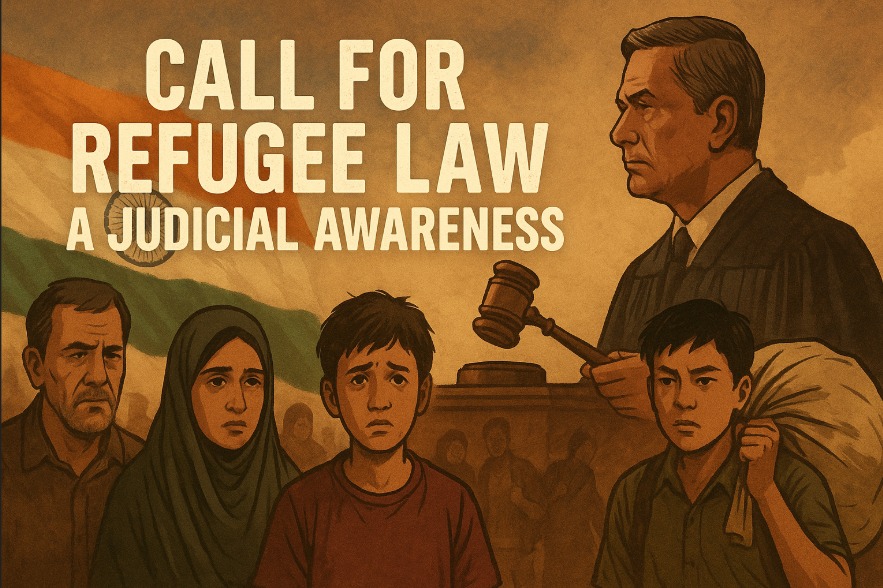Introduction: Who Is a Refugee in India’s Eyes?
India currently hosts nearly 883,000 refugees, predominantly from Afghanistan, Sri Lanka, Myanmar and Tibet. Yet there’s no dedicated Indian law defining ‘refugee’ or outlining their rights. Instead, refugees fall under the nebulous and ignorant category of “foreigners.”
A contentious Supreme Court case
In May 2025, a Tamil refugee from Sri Lanka sought to “out-camp” in India in order to find resettlement elsewhere due to fear of persecution upon their return.
Justice Dipankar Datta said:
Does India serve as a Dharamshala for refugees from around the globe? With a population of 140 crore, we are having difficulties.
“Not a Public Shelter” is a government signal
Political rhetoric serves to further exacerbate the gap. Home Minister Amit Shah clarified during debate on the Immigration & Foreigners Bill, 2025:
“India is not a Dharamshala where anyone can come and settle for any reason…”.
Despite unifying four earlier statutes, this Act does not define or protect refugees, leaving their status unclear.
Without making a distinction between tourists, undocumented immigrants, and actual refugees, the Foreigners Act of 1946 grants the government extensive authority over all non-citizens.
Regardless of persecution or concern for their safety, officials have the authority to expel anyone who enters the country without the necessary travel documents under the Passport (Entry into India) Act of 1920. The Citizenship Act of 1955, which specifically benefits naturalized citizens, further pushes asylum seekers into legal limbo.
While Articles 14 and 21 of the Constitution promise equality and the right to life to every person, courts have often had to interpret these protections cautiously and defensively when it comes to refugees—doing what they can within limited legal bounds.
Involvement of UNHCR: India has not ratified the 1951 Refugee Convention. Although UNHCR performs Refugee Status Determination (RSD), UNHCR cards are not always recognized by governments.
Judicial Awareness: Expert Yet Inequitable
There are still gaps even though courts have shown sympathetic jurisprudence in refugee cases. In a noted hearing involving Rohingya refugees, justices asked: “What is UNHCR?”—signalling a lack of basic awareness about refugee institutions.
International and Constitutional Obligations
Principle of non‑refoulement (no forced return to countries where one faces persecution) is customary international law, binding on India despite non-ratification .
The 1984 Torture Convention reinforces the principle that no one should be deported to a place where they might face danger. It adds another layer of support for protecting vulnerable individuals from forced return.
Article 51 of the Indian Constitution encourages the country to respect and uphold international law. Indian courts have, at times, drawn on documents like the UN Charter to interpret and expand the scope of individual rights.
But in practice, when domestic law overrides international standards, the safety net meant for refugees often falls apart—and their protections become uncertain.
The Immediate Need for a Refugee Law
Legal clarity—a clear and structured framework that outlines the rights of refugees, determines their status, and provides an open and transparent decision-making process—is now necessary.
Judicial education is also essential. Judges need to become more knowledgeable about international norms and how the UN and other international organizations handle refugee cases.
It all boils down to finding the right balance between acknowledging India’s vulnerable borders and security concerns and ensuring that those fleeing persecution or violence are treated with dignity and compassion.
AUTHOR
Pragya Jakhar is a second-year Lovely Professional University student pursuing a B.A. LL.B. (Hons.). Human rights and constitutional law particularly interest her. Pragya likes to write about legal subjects and is committed to improving and making the legal system more accessible to all.
Throughout the years, she has written numerous articles that examine important legal issues, and her growing comprehension of the operation of the law, both in books and in practice, allows her to contribute perceptive opinions to academic and policy discussions. She enjoys keeping up with news and significant court decisions.

